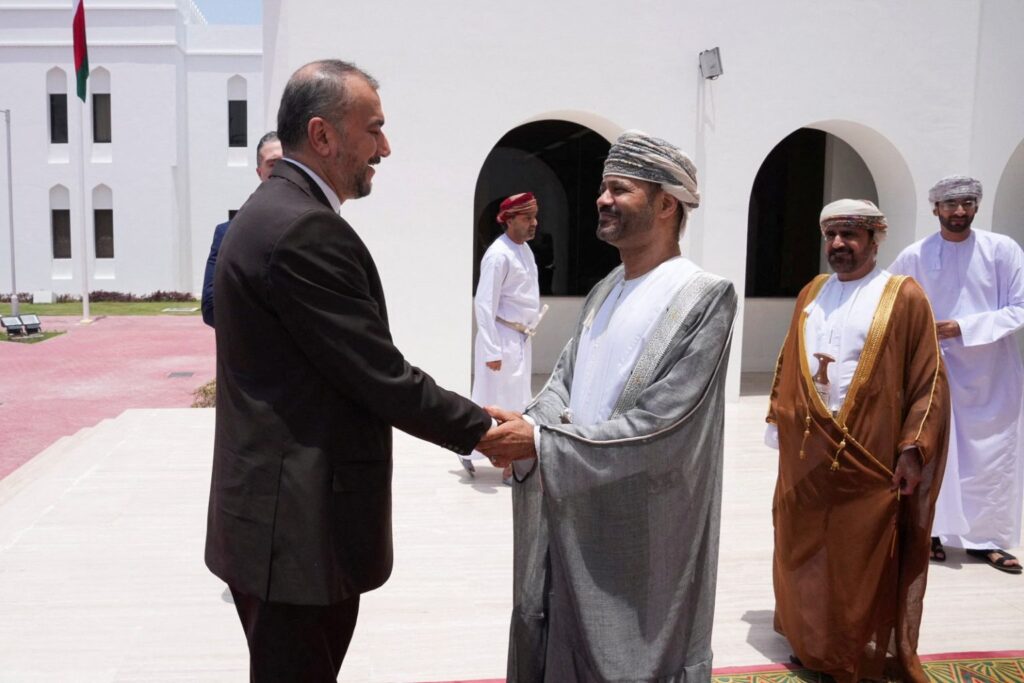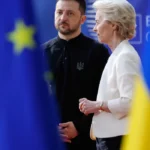Last week, Iranian Foreign Minister Hossein Amir-Abdollahian visited Qatar, Oman, Kuwait and the United Arab Emirates. In accordance with the mantra of the administration of Ebrahim Raisi “Neighbors first”, Tehran favors arrangements with regional actors rather than rapprochement with the West. Building on the diplomatic agreement reached on March 10 with Saudi Arabia under the aegis of China, Iran is seizing all opportunities to significantly improve its relations with the States of the Gulf Cooperation Council and Egypt [GCC for Gulf Cooperation Council, NdT].
Amir-Abdollahian began his Gulf tour through Doha on June 19. The next day, he met with Emir Sheikh Tamim bin Hamad in the Qatari capital to discuss issues of Afghanistan, Palestine and other international issues of interest to the two countries. Tehran’s top diplomat stressed how determined the Islamic Republic is to develop its bilateral relations with Qatar in the areas of trade, economy and culture.
Shortly after Amir-Abdollahian’s meeting with the Qatari head of state, Doha hosted talks between European Union mediator Enrique Mora and Tehran’s chief nuclear negotiator Ali Bagheri Kani. days after Iran’s Supreme Leader Ayatollah Ali Khamenei said a new nuclear deal with Western powers was a possibility.
The following day, Amir-Abdollahian arrived in Oman and Kuwait for the second and third legs of his tour. In Muscat, the head of diplomacy from Tehran met his Omani counterpart,
Sayyid Badr al-Busaidi. Their exchanges focused on bilateral affairs during a meeting that Amir-Abdollahian described as “constructive”. The sultanate’s foreign minister said: “There is a broad consensus between the visions of the two states on a series of issues […] that will contribute to stability, security and peace. This is evidenced by Sultan Haitham bin Tariq al-Said’s recent trip to Tehran, which confirms that Oman retains its role as a bridge between Iran and the West, thus complementing the diplomatic efforts deployed by Qatar.
In Kuwait, Amir-Abdollahian met with Kuwaiti Prime Minister Sheikh Ahmed Nawaf al-Ahmed al-Sabah. At the end of their meeting, the head of Iranian diplomacy announced on social networks that “resolving the challenges through the joint participation of the countries of the region is the best way to advance nations and ensure security. in the Persian Gulf. »
The Iranian Foreign Minister has completed his GCC tour in the United Arab Emirates. Amir-Abdollahian met with Sheikh Abdullah bin Zayed al-Nahyan, who stressed “the relevance of defining an international framework allowing multilateral action based on cooperation and partnership”. Iran and the United Arab Emirates have also signed a bilateral air transport services agreement.
Both sides, both on the Iranian side and on the side of the Arab Gulf countries, have every interest in strengthening dialogue and continuing de-escalation. Tehran sticks to its commitments in terms of improving relations with other neighboring countries, while the GCC states, for their part, “are closing a tense chapter and trying to open a new page Bader al-Saif, a professor at Kuwait University, said in an interview with Responsible Statecraft.
“The pendulum continues to swing between escalation and de-escalation. Now that he is leaning towards de-escalation, Tehran’s chief diplomat and his Gulf counterparts have every reason to learn from the lessons of the past and avoid re-engaging using tried-and-tested methods that do not yield lasting results,” he said. explained Dr. al-Saif. “A new approach is needed. The pillars should be concerted multilateralism, economic diplomacy, educational reforms, more cultural exchanges, non-interference and mutual respect for the sovereignty of both sides. »
Rapprochements with GCC states allow Iran to meet challenges
It is important to put these visits in the context of Tehran’s desire to reduce its isolation as Western countries continue to impose harsh sanctions on the country. Strengthening ties with Saudi Arabia and smaller GCC states remains essential in this regard.
“Tehran’s strategy to circumvent Western efforts to isolate Iran relies to a large extent on seeking political and economic integration with its immediate neighbours,” Trita Parsi, executive vice president of the government, told Responsible Statecraft. Quincy Institute.
“Amir-Abdollahian is the front man of the Islamic Republic. The real negotiations are conducted by representatives of the Supreme Leader,” said Barbara Slavin, a senior fellow at the Stimson Center and a lecturer in international affairs at George Washington University. “The tour he did, however, was a good PR move and was less about reaching tangible deals and more about giving the impression that Iran is no longer isolated. »
Abdullah Baabood, an Omani scholar and visiting professor at Waseda University in Tokyo, said Iran was determined to take advantage of the March 10 diplomatic agreement with Saudi Arabia to “improve its relations with other states in the Gulf” in order to help “develop cooperation, especially in the economic field, for which Iran needs significant support, especially given the situation of its economy. »
Tehran is seeking to “reassure the smaller Gulf states about its future policies in the region”, Baabood added. He believes that Amir-Abdollahian’s recent tour in the GCC was “an attempt by Iran to build more bridges with the Gulf States to ensure stability in the region and strengthen cooperation in different fields, including the most important sector, namely the economy. »
Implications of the normalization agreement between Iran and Saudi Arabia
The dynamics shaping the relationship between the GCC and Iran have changed in light of the March 10 diplomatic accord between Riyadh and Tehran. Beijing’s role in brokering this deal is important from the perspective of Gulf policymakers. The GCC states have understood that China is playing a more assertive diplomatic role in the region by filling the vacuums created by Washington’s foreign policy failure to bring more stability to the Middle East, and they consider the growing influence of Beijing as potentially positive from the point of view of building peace in the region.
“Riyadh and its GCC partners recognize China’s role in mediating the ongoing rapprochement, even if they are cautious and do not want to raise excessive hopes,” Joseph A. Kéchichian, a researcher at the King Faisal Center for Research and Islamic Studies in Riyadh. “Certain conditions have been laid down at various stages, apparently guaranteed by Beijing, which in effect means that all parties will move slowly. Time will determine progress. »
Even before the start of this new period of Saudi-Iranian détente, Oman, Qatar and Kuwait had very pragmatic relations with Iran and warm relations with Tehran. However, these “dove” members of the GCC were, in various capacities and degrees, attentive to Saudi Arabia’s sense of insecurity vis-à-vis Tehran. A factor that has limited their ties with Iran. Now that Saudi-Iranian relations are warming, smaller GCC states can in turn strengthen their ties with Tehran by worrying much less about Riyadh issues.
“This new agreement between Iran and Saudi Arabia paves the way for [smaller] Gulf states to go further in their cooperation with Iran,” Baabood said. “It makes things easier, because no one will blame them for deepening their relationship with Iran. In a way, therefore, it is beneficial for the smaller Gulf states to move forward, and they see Saudi Arabia agreeing to it. »
This article is originally published on .les-crises.fr







